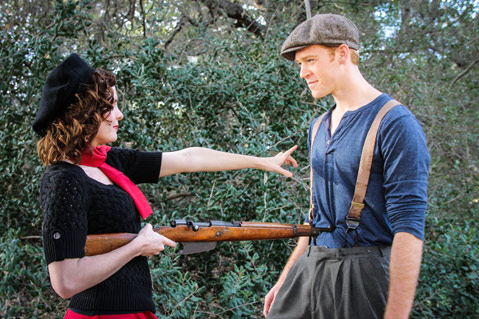Review: Bonnie and Clyde: The Musical
Outlaw Couple Sings at Center Stage Theater through April 13

Samantha Eve’s Out of the Box Theatre Company has defined a role for itself in the Santa Barbara theatrical ecosystem, and as a result, we get to see and hear some of the best new alternative musicals being written and produced all around the country. While some of these shows, like Spring Awakening, have broken through to become mainstream hits, others, like Bonnie and Clyde, remain on the fringe, not so much because of style, as because the new musical revolution is incomplete and ongoing. This production of Bonnie and Clyde: The Musical emphasized what’s fully formed and satisfying about the show’s book, but the mixture of styles and the sequencing of the songs are elements that remain hard to swallow.
Katherine Bottoms as Bonnie Parker and Lafras Le Roux as Clyde Barrow were inevitably at the center of things, and both performers sang well and brought vitality to their characters. Bonnie is depicted as yearning for distinction, to be an “it” girl in the vocabulary of the period, and Bottoms certainly has the stage presence to deliver on that dream. Le Roux’s Barrow occupies more of a traditional bad boy role, showing a kind of dreadful determination to remain outside the law, especially after repeated thrashings in jail at the hands of Ted Hinton (Dillon Yuhasz), a young deputy sheriff who is portrayed as Clyde’s rival for Bonnie’s affection. This triangle, which was concocted by the playwrights out of some scraps of historical fact, should probably be the center of dramatic conflict for the piece, but a second plot element concerning Blanche Barrow (Samantha Eve) and her husband Buck Barrow (Will Schneiderman), and their descent into becoming part of the Bonnie and Clyde gang ends up stealing the show.
The real life outlaws Bonnie Parker and Clyde Barrow were made famous for the second time when the spectacularly violent film starring Warren Beatty and Faye Dunaway blasted into theaters in 1967, heralding the arrival of the “easy riders and raging bulls” era in Hollywood. The problem with this musical version of the story is that because of its lack of any specific stylistic identity, either musical or theatrical, one leaves the theater wondering just what the point is. The new musical theater deserves better material.



